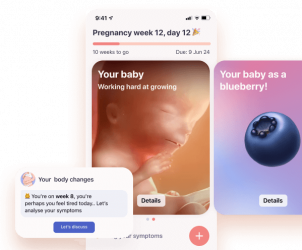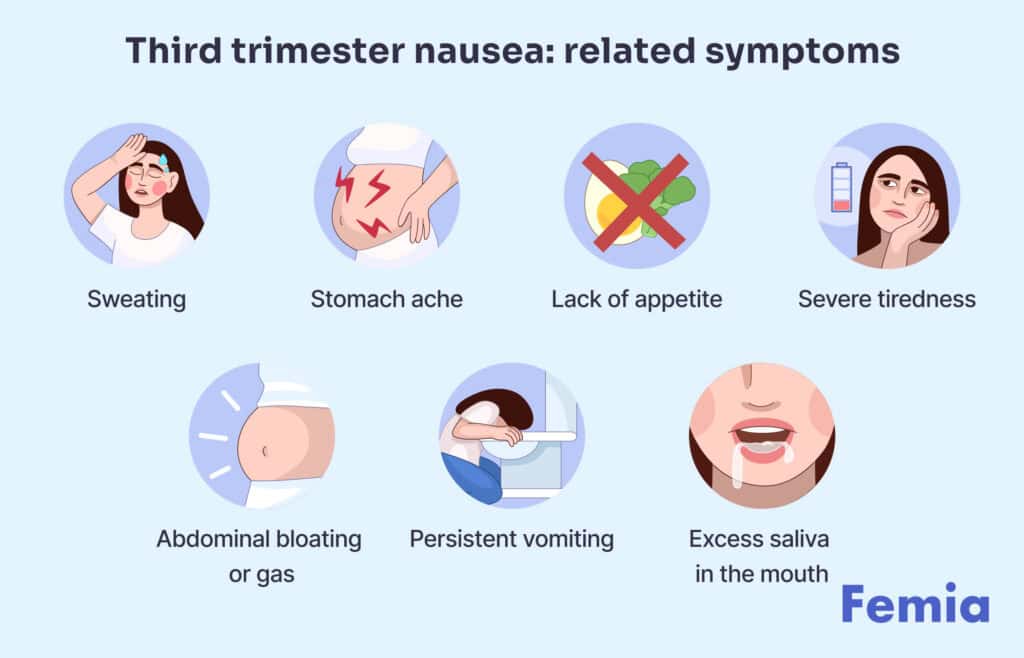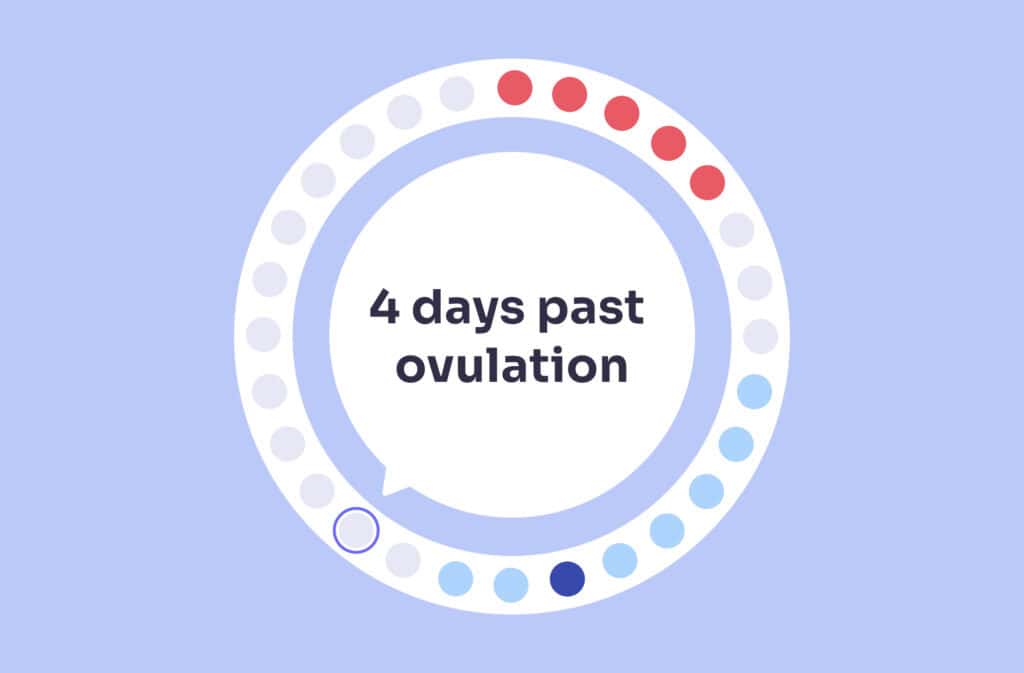Femia > Health Library > Pregnancy > Pregnancy health > Third-trimester nausea: Why it returned and how to find relief
Third-trimester nausea: Why it returned and how to find relief

- Updated Feb 25, 2025
- Published
CRAFTED BY HUMAN
Crafted by human At Femia, we provide accurate and up-to-date information at every stage of your journey, from trying to conceive, pregnancy and postnatal support. All content is created by a real person based on in-depth research and own professional experience. Femia ensures that you will receive expert advice, strict accuracy and a personalized approach from our authors/medical experts. Learn more about our editorial policy.
FACT CHECKED
Fact checked At Femia Health, we maintain the highest standards of editorial excellence in delivering content focused on helping you conceive, guiding you through pregnancy, and supporting you postpartum. Explore our content review principles to learn how we ensure the accuracy and quality of our health and lifestyle tips for every stage of your journey.
Third-trimester nausea, experienced by 15-20% of pregnant women, is often unexpected but generally normal. It’s typically caused by hormonal fluctuations, pressure from the enlarged uterus, and digestive changes.
While uncomfortable, it’s usually manageable through:
- Eating small, frequent meals of bland, low-fat foods;
- Staying well-hydrated;
- Getting plenty of rest;
- Avoiding strong smells and flavors.
Entering the final stretch of your pregnancy, you may experience a variety of common third-trimester symptoms, including heartburn, breast tenderness, and swelling, among others. However, starting to feel nauseous and throwing up in the third trimester (like you probably did at the beginning of your pregnancy) can be confusing and concerning.
The truth is that nausea, which is commonly linked to the first trimester, can return in the third trimester. It might be unexpected and can cause a lot of discomfort. However, it’s a common part of late pregnancy.
In this article, you’ll learn what causes third-trimester nausea, what related symptoms might accompany it, and how common it is. Additionally, we’ll give you practical advice on how to manage nausea and start feeling better.

What causes nausea in the third trimester?
3rd-trimester nausea might occur due to several reasons:
- Hormonal fluctuations. The two predominant pregnancy hormones, progesterone and estrogen, are known to trigger the sensation of nausea when their ratio changes.
- Growing uterus. As your uterus reaches its maximum size, it might add excessive pressure on your stomach. This can cause your muscles and ligaments to occasionally ache and cramp, and might also contribute to discomfort-induced nausea.
- Changes in digestion. During pregnancy, your digestion tends to slow down, causing food to stay undigested in your stomach for longer. These digestive shifts, in addition to increasing pressure on the stomach from an enlarged, third-trimester uterus, can make you feel nauseous.
👉Find out more: 10 weird pregnancy symptoms you didn’t know existed
Why does nausea come back in the third trimester?
As you already know, hormonal changes might be the reason. Here’s a deeper look into the different hormones that might be causing your discomfort:
- Progesterone. Its increase has a relaxing effect on the contractility of your smooth muscles (such as the stomach and intestines), which slows down gastric emptying. A relaxed valve makes it easier for your stomach’s contents (which remain there for longer now) to go back up into the esophagus.
- Estrogen. While the progesterone levels start gradually decreasing in the third trimester, estrogen levels rise. As shown by multiple birth-control pill studies, increasing estrogen might irritate the stomach lining, and the higher its level, the more likely you are to start feeling nauseous.
- Cortisol. The final stretch of your pregnancy is exciting but might also give you a lot of stress and anxiety about the upcoming birth. A cortisol surge might also result in nausea.
Related symptoms
Though 3rd-trimester nausea might be giving you enough discomfort on its own, it’s commonly accompanied by additional sickness symptoms, such as:

- Excess saliva in the mouth;
- Sweating;
- Abdominal bloating or gas;
- Stomach ache;
- Lack of appetite;
- Severe tiredness;
- Persistent vomiting.
Throwing up in the third trimester: Is it normal?
Vomiting is a common symptom of early pregnancy that affects around 8 out of every 10 women. Most often, it shows up around the 9th week and steps back around weeks 12 to 20.
Throwing up in the third trimester affects a minority of pregnant women (around 3%), so while it’s rare and not as common as nausea, it’s not necessarily abnormal. Using a pregnancy app is useful and can help you track third-trimester symptoms.
If you are experiencing vomiting, here are some things you can do for relief:
- Drink plenty of water to avoid dehydration.
- Eat plain foods that are low in fats and high in carbohydrates (e.g. starchy vegetables, grains, and so on).
- Avoid foods and drinks with strong smells that might worsen your sickness.
- Get lots of rest.
How common is nausea in the third trimester?
While many women enter the final stretch of their pregnancy feeling significantly better than during the first trimester, studies show that the prevalence of well-being gradually decreases by the end of the third trimester – from 50% during week 31 to only 24% during week 42. The three most prevalent symptoms are:
- Heartburn: 60%
- Nausea: 16%
- Vomiting: 7%
These three symptoms are reported to be constant throughout the entire study period, hinting at a notable prevalence of nausea in the third trimester.
The severity of this condition can vary significantly from one woman to another, whereas some pregnant women may not experience it at all. Generally, symptoms of morning sickness continue until the third trimester in approximately 15 to 20% of pregnant women. For 5% of women, they persist until labor. That is all to say that feeling nauseous isn’t unnatural. In fact, it is a rather common experience.
It’s also been found in studies that the presence of nausea and vomiting in the third trimester might be related to whether or not the woman already has children. The majority of women under 28 who are pregnant for the first time, along with women 28 or older who are either first-time mothers or have had one child, didn’t report experiencing nausea at all. However, women of the same age with multiple children regularly reported feeling nauseous during the final stretch.[4]
👉Find out more: Baby fruit size by week: A trimester-by-trimester guide to your growing little one
How to stop feeling sick in the third trimester
Feeling persistently nauseous and even throwing up in the third trimester can seriously hinder your quality of life and cause lots of discomfort. To have the smoothest and best third-trimester possible, it will be wise to seek symptom management tactics that can help you.
Here are a few general recommendations to try:
- Food. Everything you consume might backfire and make your nausea and vomiting worse. If this is the case for you, choosing your food carefully will become a major priority. Avoid high-fat foods as they slow gastric emptying (which is already slowed due to pregnancy) and are known to worsen nausea. Also, avoid foods with a strong smell or taste, especially spicy food. These can irritate your senses and stomach, causing you to feel worse. Opt for carbohydrate-high foods like pasta instead to provide yourself with enough energy and nutrients. Most importantly, eat frequent meals in small portions to prevent overloading your stomach. It may also help to eat cold food instead of hot.
- Snacks. Dry, snack-like foods are considered helpful when nausea strikes. Consider snacking on some mild-tasting crackers, toast, breadsticks, cereal or granola, or other dry foods every few hours to feel better.
- Drinks. Dehydration is often a culprit of nausea, which is why drinking plenty of liquids is crucial when feeling queasy. Just like with foods, avoid drinks with harsh smells or tastes. Consider options like plain water, fruit juice, sports drinks, non-fat yogurt, etc.
- Rest. Nausea in pregnancy is frequently accompanied by feeling extremely tired, which makes rest an important part of managing it.
Pro tip: If you are feeling sick, consider choosing products that are gentle on a sensitive stomach. These include yogurt, bananas, applesauce, ginger, greens, etc.
When nausea in the third trimester may be a sign of labor
When you’re entering the final week of your third trimester, it’s common to experience certain signals about the upcoming labor. The symptoms typically show between 48 and 24 days before the delivery.
Nausea might be one of the signs. However, since it might be caused by other factors, it’s hard to predict the start of labor by nausea alone. Other symptoms that might tell you that you’re approaching the X-day include:
- Nesting;
- Lightening or dropping of the baby;
- Bloody show (light discharge with blood and mucus);
- Diarrhea.
👉Find out more: Understanding early decelerations in fetal heart rate monitoring
When to see a doctor
Feeling nauseous and even throwing up in the third trimester is generally considered normal and doesn’t require seeing a doctor. However, since every woman’s pregnancy experience is different, it’s important to focus on your feelings and well-being to notice when nausea might be a sign to get personalized medical advice.
For example, you might want to talk to your doctor if:
- Nausea is too severe or persistent.
- It’s accompanied by other concerning symptoms, such as severe headache, blurred vision, or significant swelling.
These might be signs of hyperemesis gravidarum–a pregnancy complication linked to severe nausea, vomiting, weight loss, and dehydration. Though this condition is rare, it can occur in the third trimester and requires medical treatment to manage symptoms and prevent complications, so it’s important to note any concerning symptoms you might be experiencing.

Questions from the Femia community
I’m experiencing heartburn during the third trimester. Can it be contributing to nausea?
Heartburn is the most common third-trimester symptom according to studies. It occurs due to an enhanced pressure on the stomach by the enlarged uterus, which can cause acid reflux. Accompanied by difficulty swallowing, a sour taste in the mouth, and burning sensations, heartburn can contribute to nausea or vomiting.
I’m not sure if it is safe to take my anti-nausea medication in the third trimester, please advise.
While some medications are considered safe for pregnant women, it’s always crucial to receive personalized medical advice before taking any medicines to avoid potential adverse effects. If your nausea isn’t severe, you might also try other coping techniques.
I’m worrying that third-trimester nausea affects the baby, is it?
Though nausea is mostly believed to appear in the first trimester, it’s not uncommon or abnormal for women to experience it during the third trimester. Mild to moderate nausea and even vomiting are generally considered normal and don’t affect the baby. However, severe nausea accompanied by weight loss or dehydration might require seeing a doctor.
The bottom line
During the third trimester, many females believe that morning sickness has long been left behind and don’t expect it to come back. As a result, they can naturally feel frustrated if they suddenly face nausea in the third trimester of pregnancy. Apart from frustration, this causes plenty of discomfort and may interfere with your daily life rhythm. However, despite common beliefs, it’s not uncommon and might be a natural symptom of the final stage of your pregnancy.
Third-trimester nausea might result from hormonal changes, additional pressure on your stomach, and the added stress before labor. Albeit uncomfortable, it’s usually temporary and manageable. Choosing the right foods, resting, and staying hydrated can help you to feel better. However, in the case of severe nausea and vomiting, you might need to consult with your healthcare provider.
References
- “Your third trimester guide.” UNICEF. https://www.unicef.org/parenting/pregnancy-milestones/third-trimester.
- Di Lorenzo C. “Functional Nausea Is Real and Makes You Sick.” Front Pediatr, 25, Feb. 2022. https://www.ncbi.nlm.nih.gov/pmc/articles/PMC8914080/#:~:text=Normally%2C%20cortisol%20levels%20rise%20during,particularly%20predisposed%20individuals%20(11).
- “Vomiting and morning sickness.” The National Health Service, 17, Apr. 2024. https://www.nhs.uk/pregnancy/related-conditions/common-symptoms/vomiting-and-morning-sickness/#:~:text=eat%20small%2C%20frequent%20meals%20of,often%20may%20help%20prevent%20vomiting.
- Knudsen A, Lebech M, Hansen M. “Upper gastrointestinal symptoms in the third trimester of the normal pregnancy.” Eur J Obstet Gynecol Reprod Biol, May, 1995. https://pubmed.ncbi.nlm.nih.gov/7635226/.
- Feinle C, Grundy D, Read NW. “Fat increases vection-induced nausea independent of changes in gastric emptying.” Physiol Behav, Dec. 1995. https://pubmed.ncbi.nlm.nih.gov/8623015/.
- Nicholas Williams. “Can Dehydration Cause Nausea?” Community Health Centers, 29, May, 2024. https://www.chcfl.org/can-dehydration-cause-nausea/#:~:text=Proper%20hydration%20is%20crucial%20for%20overall%20health%2C%20and%20staying%20adequately,if%20you%20experience%20persistent%20symptoms..
- Jennings LK, Mahdy H. “Hyperemesis Gravidarum.” StatPearls, Jan. 2024. https://www.ncbi.nlm.nih.gov/books/NBK532917/#:~:text=Hyperemesis%20gravidarum%20refers%20to%20intractable,nausea%20and%20vomiting%20in%20pregnancy.

Understand what happens at 4 days past ovulation (4 DPO), including common pregnancy symptoms and when to take a pregnancy test. Expert advice from Femia.

Do you still ovulate on birth control? Learn how hormonal contraceptives prevent pregnancy, their effects on ovulation, and what to expect.

Learn how to put a pillow under your hips to get pregnant with our detailed guide, complete with images. Discover effective techniques to enhance your chances of conception.

